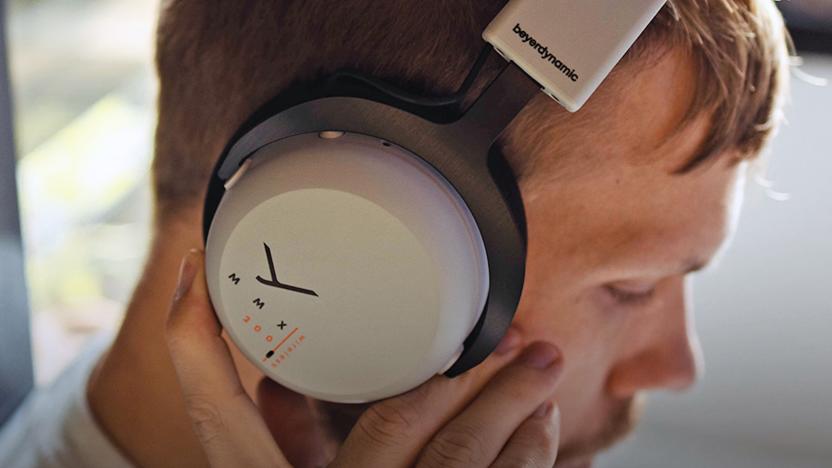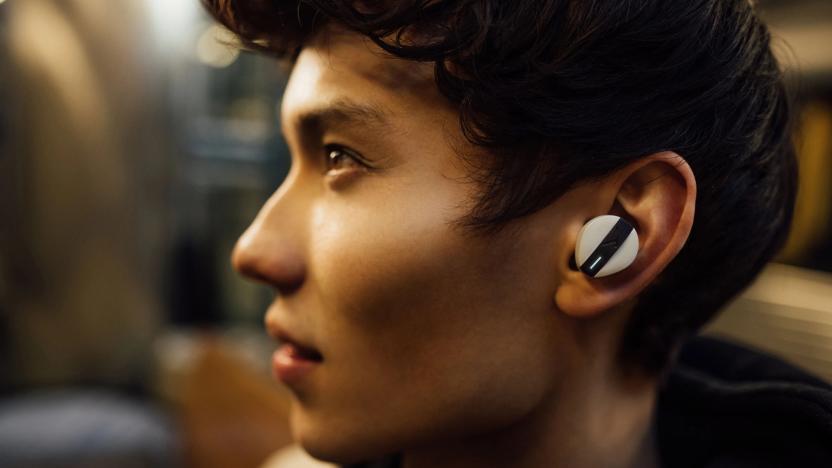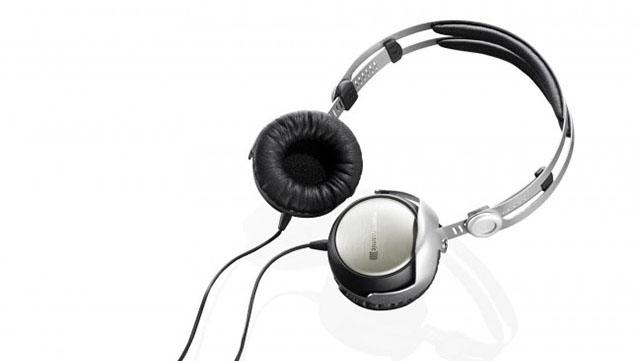beyerdynamic
Latest

Beyerdynamic releases its first-ever wireless gaming headset
Beyerdynamic just released its first-ever pair of wireless gaming headphones. The MMX 200 headset gets up to 50 hours per charge and costs $250.

Beyerdynamic reveals Free Byrd, its first true wireless earbuds
Here's hoping the $249 buds are worth the wait.

Beyer T 51 i headphones are a sonic treat for your iOS device
Beyer has a long engineering tradition going back to 1924. Its well-regarded headphones are used by consumer and professionals in recording studios. The German company sent a pair of its Beyerdyamic T 51 i iOS compatible headphones, and the sound was terrific. Specifications Transmission type Wired Headphone design (operating principle) Closed Headphone impedance 32 ohms Headphone frequency response 10 Hz - 23,000 Hz Nominal sound pressure level 111 dB Construction Supraaural (on-ear) Cable & plug Stereo jack plug 3.5 mm (1/8") & ¼" adapter (6.35 mm) TRRS standard CTIA (adapter cable for OMTP included) Net weight without packaging 174 g Design Highlights The T 51 i phones ( US$313.99 but lower from online merchants) have a three-button remote control for phone calls and media playback. The phones use a 1/4" jack adapter for older audio equipment, and an in-flight adapter for airplane audio systems. The ear cups swivel 90 degrees and the headphones come in a nice nylon carrying case. Using and listening I'm pretty picky about sound and comfort, and I have to say this Beyer product came out very well. Listening to classical, jazz and rock the headphones acquitted themselves well. Strings were pure and smooth, bass was deep and not artificially enhanced. Comparing them to my B&W P5 phones ($299.99) I found the Beyer model very similar, but it reached a little deeper into the bass. Comfort was very good on the Beyer phones, and the memory foam around the ears made for a nice fit. I would rate the Beyer a tad more comfortable than the B&Ws. The sonic signature of both was similar. Besides listening on my iPhone, I listened to some High Resolution tracks through my Oppo BDP-103 disc player and the sounds were even better with more extended frequency response and more precision of instrument placement, so it's clear the Beyers can be used in a mobile environment or at home with the highest quality equipment. Testing against my headphone of choice for home listening, the Sennheiser HD 600, ($399.95) I thought the Beyer had a better low end, while the Sennheiser headsets were able to squeeze a bit more out of the highest frequencies. The Sennhesiers are large, and the driver is well off the ear, while the Beyer T 51 i drivers are right against the ear, like the B&W. That alone makes for a different kind of sound, with one approach not being necessarily better than the other. My only beef is the headphone cord is not replaceable, but instead it is direct wired. The T 51 i is a sibling to the Beyer T 51 p, the former being designed for mobile. Both phones have the same drivers. Conclusions The T 51 i is a terrific headset. It sported a smooth frequency response, and comfort was high, even after wearing the phones for extended periods of time. I appreciated the lightweight nature of the headset, never feeling it was squashing my ears with undue pressure. Listening to string music from Mozart and unamplified instruments from a Jennifer Warnes CD were all clean and realistic. Beyer has a winner with the T 51 i. If you are looking for high quality headphones or wanting to step up from your Apple supplied earbuds, give this headset a try.

BBK's Vivo X1 is a phone for audiophiles, packs high-end DAC and Beyerdynamic earphones
We've never paid much attention to BBK's phones in the past, but today, this Chinese company -- who's actually the creator of the Oppo brand for the Western market -- announced a rather interesting Android 4.1 device. The idea of this Vivo X1 is that BBK wants to take audio very seriously on its new flagship phone, which is why it's been given a Cirrus Logic CS4398 digital-analog converter plus a CS8422 sample-rate converter -- a combo that's seemingly popular amongst Hi-Fi connoisseurs and manufacturers. And to match that audio performance, BBK's also throwing in a pair of Beyerdynamic MMX 71 iE earphones (20Hz-22kHz, 12Ω, 104dB) as part of the ¥2,498 ($400) package; though you can also choose the AKG K420 or the Sennheiser CX215 instead when buying from BBK's official online store. The rest of the Vivo X1, however, is more bog-standard in comparison: MediaTek MT6577T processor (1.2GHz, dual core, Cortex-A9), 4.7-inch 960 x 540 IPS display, 1GB RAM, 16GB built-in storage, eight-megapixel main camera, 1.3-megapixel front-facing camera and WCDMA 2100 3G radio. The only real highlight here is perhaps the 2,000mAh battery, which is non-removable but still rather impressive considering it's in a 6.55mm-thin body. Even the Oppo Finder has a 6.65mm thickness and yet lacks a 3.5mm headphone jack, whereas BBK's thinner phone has one. What's missing here is microSD expansion, but there's 15GB of Baidu cloud storage should users wish to take advantage of that. The Vivo X1 may just be available for pre-order now, but the folks at BBK couldn't help but tease the highlights of its next-generation device already: bezel-free design, 1080p display, big battery and 13-megapixel camera. We look forward to that.

Beyerdynamic brings trio of "5.1" headphones to America
Beyerdynamic's "head tracking" Headzone Home (pictured) system has been available across the pond for quite some time, but the outfit has just announced that it, along with the Headzone Home HT and Headzone Game, are now headed stateside. The headzone tech promises a "virtual 5.1 experience," which links together the processor, headphone and Head tracking receiver, and while we don't doubt that this rig would sound pretty darn good, we're a bit scared by the omission of US price tag. You know, given that the Home setup ran well over $3,000 when it launched overseas.

QPAD rolls out new high-end gaming headset
QPAD may be best known for its gamer-minded mousepads, but it looks like it's now branching out in the peripheral business with a little help from beyerdynamic, which has helped it put together its first gaming headset. From the looks of it, they certainly seem to be off to a decent enough start, with the headset boasting a frequency response of 5Hz to 30KH, ambient noise attenuation to around 18 dBA, a noise-canceling microphone, and a USB converter with volume control and a mic mute button. The ear and headband pads are also replaceable, but it looks like you just get one set with the headset. No word on a price just yet, but it looks like you'll get a fairly generous five-year warranty with 'em.

Beyerdynamic's Headzone headphones promise "perfect spatial impression"
We've got another from the pre-IFA run-up, this time it's Germany's own Beyerdynamic getting set to launch their Headzone Home surround-sound headphone system. Using their patented "Headtracking" tech, the kit is said to react to the listener's head movements and automatically adapt "the space impression" in real-time. In other words, the actors' voices remain at the front of the room even while turning your head. They even claim to deliver "perfect spatial impression" regardless of your room acoustics. With a list price of €2490/$3,397, they'd better. Best give these a whirl in a noisy showroom before laying out that kind of dough, though.

Beyerdynamic's Headzone headphone promise "perfect spatial impression"
We've got another from the pre-IFA run-up, this time it's Germany's own Beyerdynamic getting set to launch their Headzone Home surround-sound headphone system. Using their patented "Headtracking" tech, the kit is said to react to the listener's head movements and automatically adapt "the space impression" in real-time. In other words, the actors' voices remain at the front of the room even while turning your head. They even claim to deliver "perfect spatial impression" regardless of your room acoustics. With a list price of €2490/$3,397, they'd better. Best give these a whirl in a noisy showroom before laying out that kind of dough, though.




